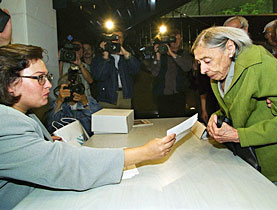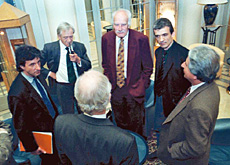Christoph Meili returns – as hero or villain?

There's been a mixed reception for Christoph Meili, the Swiss security guard who saved Holocaust-era bank documents from the shredder at UBS bank 12 years ago.
Meili has returned home from voluntary “exile” in the United States, saying he felt let down by the US.
The incident with the shredder happened in early 1997 at the height of investigations into Switzerland’s behaviour during the Second World War and in particular into dormant accounts from that era.
Meili, who was then working for an outside security firm, gave the documents he saved to a Jewish organisation. The disclosure led to the Zurich authorities opening a judicial investigation against Meili on suspicion of violating banking secrecy.
At the same time Meili was feted as a courageous whistleblower, particularly by Jewish organisations that had been seeking information from Swiss banks on money brought into the country by Holocaust victims.
Asylum in US
Meili took his family to the US after he received threats in Switzerland and was granted political asylum there.
His return has sparked much media coverage, with many people in comments to newspapers praising or criticising the man who turned his back on Switzerland and is now turning his back on the US.
“Mr Meili behaved correctly then and still suffers from unjustified accusations and hostility. Meili appears to bear that burden today. He deserves his recognition,” wrote a newspaper reader in the Basler Zeitung.
The recognition referred to is the many awards he received in honour of his action.
But just as then, opinions in Switzerland are divided. Many have not forgiven Meili for the way he left Switzerland and profited from the $1.25 billion (SFr1.43 billion) settlement reached between Swiss banks and mainly Jewish organisations in August 1998.
It is reported he received $750,000 from the settlement. He has returned home, it appears, without any money.
“Inacceptable behaviour”
“The problem with Meili is not the saving of documents but his absolutely unacceptable behaviour afterwards. Together with his US lawyer he stirred up trouble like only he could against Switzerland and now against America,” wrote another newspaper reader.
“For me he is a person who has absolutely no character and he should disappear again from Switzerland.”
Swiss papers have had a field day with Meili’s return, but the former watchman has a difficult relationship with the press, says Martin Furrer, writing in the Basler Zeitung.
This results in Meili blaming the media for making him into a traitor, but at the same it seems he cannot stop speaking to journalists.
“Meili is a free man who has made a prisoner of himself – not from the police but from the media,” writes Furrer. “They are there when Meili leaves the airport and when he later drops his bag, containing a few trousers and shirts… with friends near Olten.”
The overload has sparked a flood of negative criticism from the public as well.
“Meili does not cut a good figure. The media and film… are taking advantage of him more or less shamelessly.
“If he doesn’t remain an eternal media star, he could find a job as a simple employee,” commented another Swiss newspaper reader.
Perhaps this comment hit the nail on the head. He is reported to be currently looking for work.
“The media always try to polarise, aiming for higher circulation. Meili is the perfect victim of this strategy,” said Furrer.
swissinfo, Robert Brookes
Meili, who was born in April 1968, was working as a security guard for an outside firm at UBS in January, 1997 when he took some bank files home that were destined for the shredder.
Shredding of such Holocaust-era documents had been forbidden at the time and UBS was ordered to halt its action.
Meili took them to a Jewish organisation, which then passed them to the police.
Zurich authorities investigated him for suspected violation of banking secrecy but proceedings were later stopped.
After moving to the US because of threats against him, Meili was awarded a scholarship to Chapman University in California, where he studied communications. After his studies, he found employment in the security sector once more.
He returned to Switzerland in early April, leaving his second wife and their child in California. He is reported to be staying with friends.
In late 1996 and early 1997, a series of class action law suits was filed in the United States District Court for the Eastern District of New York against a number of Swiss banks.
They alleged that the Swiss banks collaborated with and aided the Nazi regime by knowingly retaining and concealing assets of Holocaust victims and by accepting and laundering illegally obtained Nazi loot and profits of slave labour. In the course of these lawsuits, the parties began settlement discussions.
In August 1998, the parties reached an agreement to settle the lawsuits for US $1.25 billion.
In exchange for the settlement amount paid by the Swiss banks, the plaintiffs and class members agreed to release and forever discharge the Swiss banks, the Swiss government and Swiss industry from, among other things, any and all claims relating to the Holocaust, the Second World War, and its prelude and aftermath.
The settlement was then amended to provide for an insurance claims process concerning Second World War era insurance policies issued to victims or targets of Nazi persecution by certain Swiss insurance companies.
On August 9, 2000 the presiding Judge, Edward Korman, determined that the proposed settlement was fair, reasonable and adequate, and granted it final approval.

In compliance with the JTI standards
More: SWI swissinfo.ch certified by the Journalism Trust Initiative











You can find an overview of ongoing debates with our journalists here . Please join us!
If you want to start a conversation about a topic raised in this article or want to report factual errors, email us at english@swissinfo.ch.